ADHD Terminology
July 16, 2025

If you or someone you love has ADHD, you’ve probably read books or articles, or visited various websites and online communities, to seek information about the condition. These resources often contain words and phrases that are not commonly used in everyday life, or outside of the ADHD community.
We’ve broken down some of the most common ADHD-related terms for you here, so you can accurately interpret and use them in the future. We’ve also included some quotes and posts from people with real-world experience, to help you further engage with what these terms mean to people with ADHD.
ADHDer
This is a term for someone who has ADHD.
Example use: “Do any other ADHDers feel the same way as me?”
ADHD paralysis
If you have ADHD, you sometimes might feel like you’re frozen in place, unable to stop what you’re doing and move on to tasks that you know need doing. Suddenly, that thing that was supposed to be done 3 hours ago hasn’t even been started, even though you’ve been thinking about it the whole time…
This state is known as ADHD paralysis, and is a familiar feeling for people with ADHD. Although it might sound similar to procrastination, when we put off tasks that we don’t want to do, ADHD paralysis is different because it often feels uncontrollable, compared to the conscious act of procrastination.
Getting stuck in ADHD paralysis may mean falling behind on deadlines or commitments, and may induce additional stress and anxiety as a result.
ADHD advocate René Brooks, tweeted about her experience with ADHD paralysis:
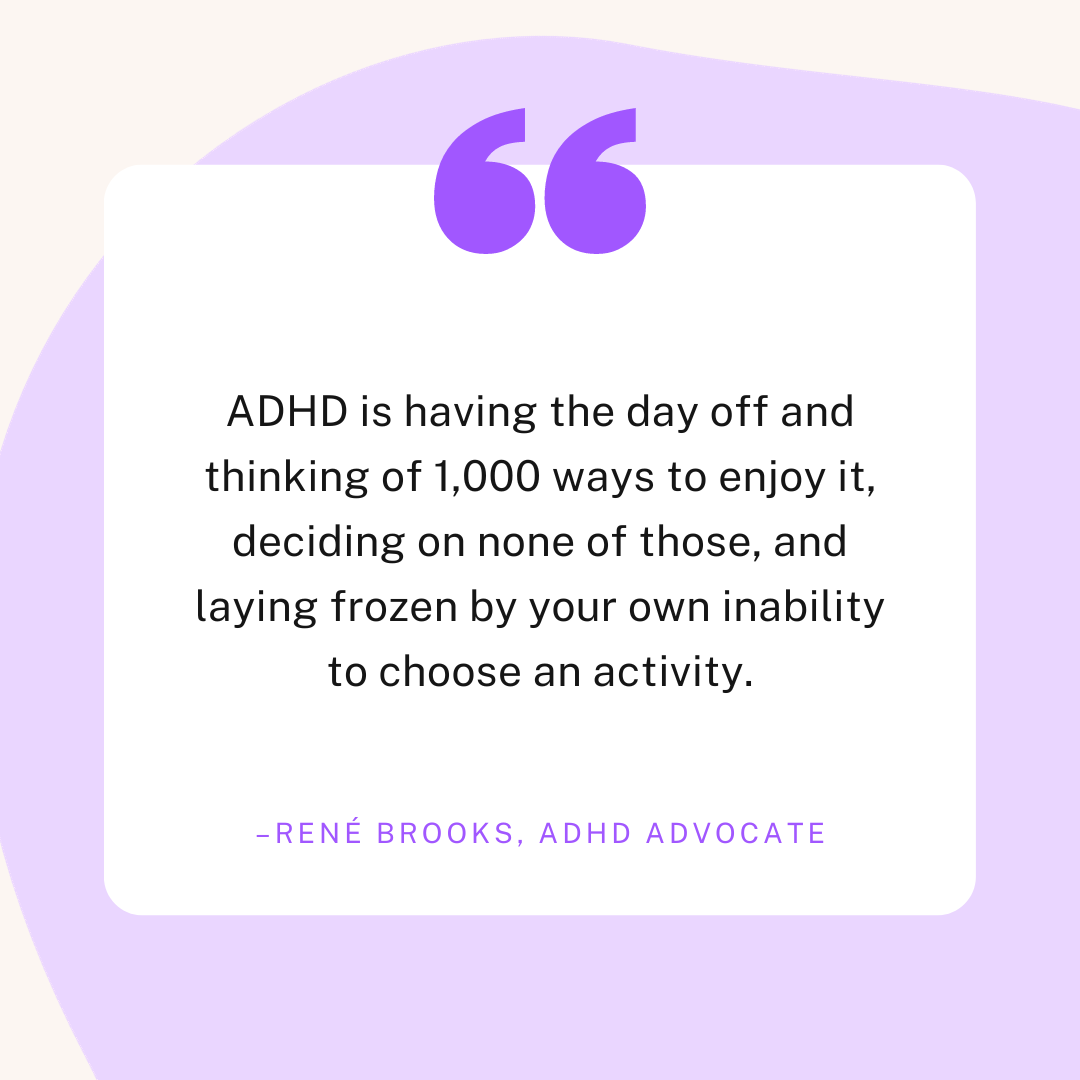
AuDHDer
A relatively new term for someone who has Autism Spectrum Disorder (ASD) and ADHD. These conditions can often co-occur, so many people who have one of these conditions also has the other.
Example use: “As an AuDHDer, I find myself constantly flipping between seeking out and withdrawing from sensory stimulation. Anyone else have the same experience?”
Reddit user @msbehaviour described what being an AuDHDer feels like for them:
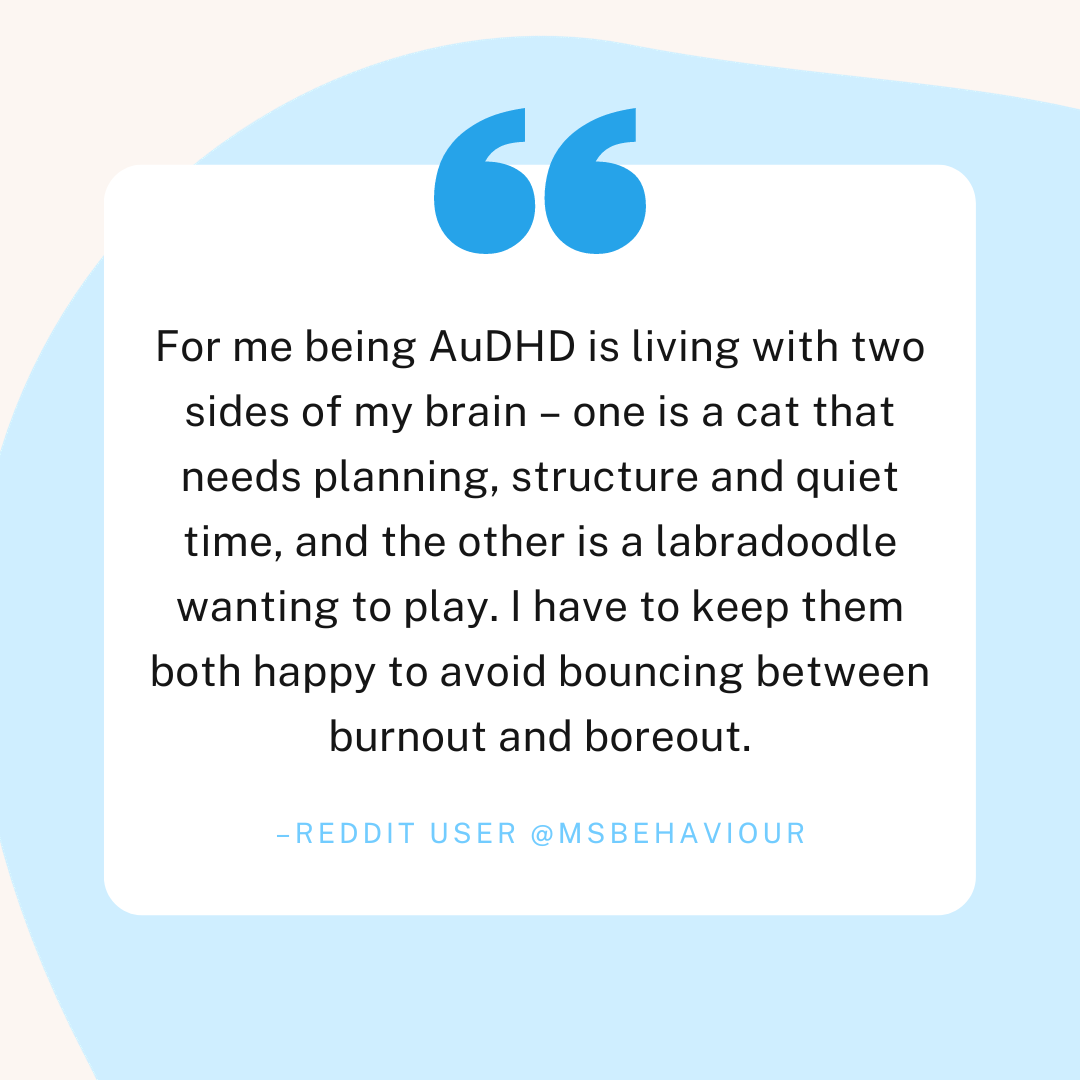
Body doubling
This is a strategy used by some people with ADHD to improve or direct focus to a task, particularly when the task is something they don’t want to do. It involves working with another person, even if you’re just in the same room and not working on the same thing. The presence of the other person may serve as external motivation by providing a model for productivity, by creating a positive working environment, and by keeping the ADHDer on task rather than distracted.
Example use: “Can you come over and be my body double while I finish this presentation?”
Demi Aspey writes about her experience with body doubling:
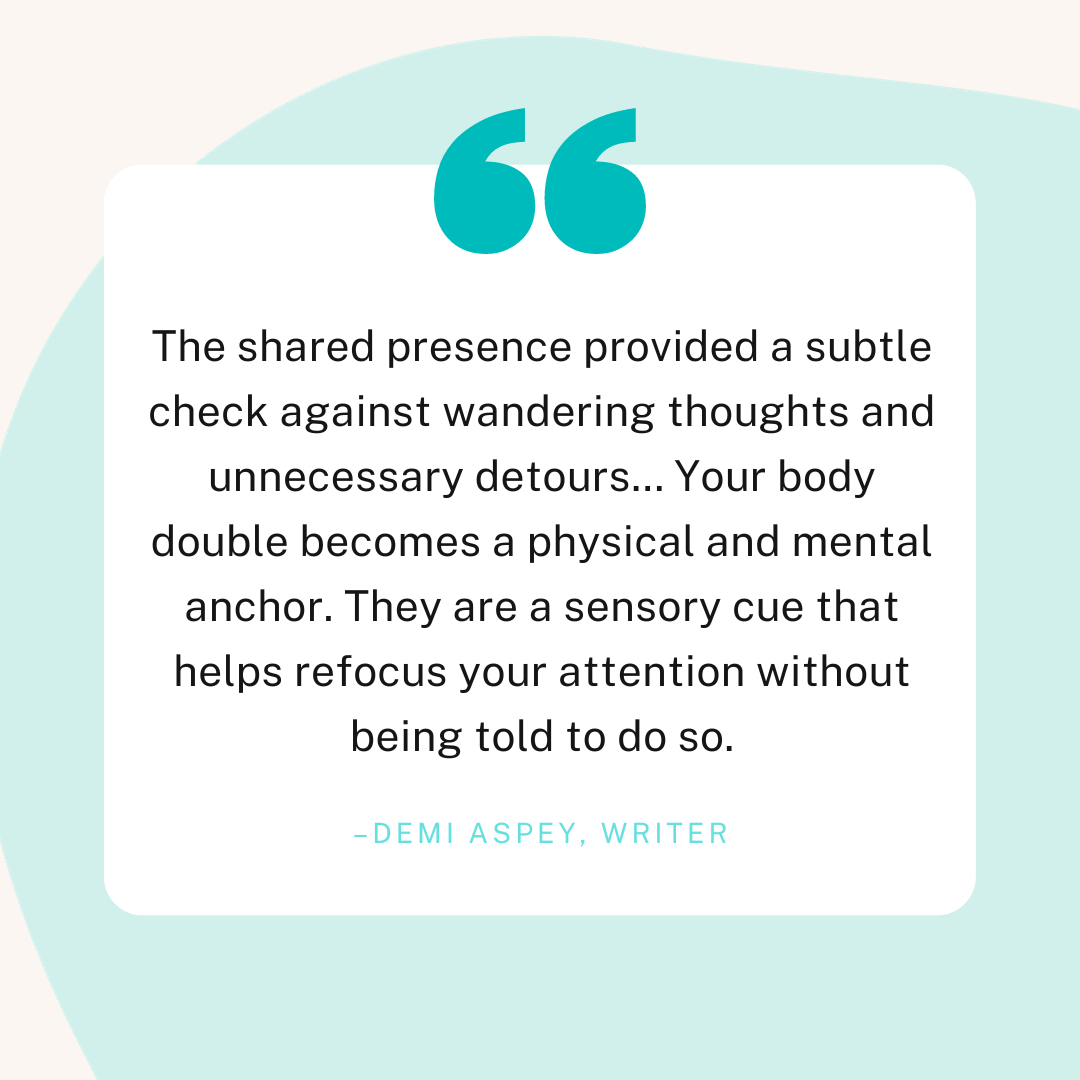
Executive functioning
Executive function skills are the mental processes that we use to complete goal-directed behaviors effectively. They help us work towards and reach goals, manage social interactions and adapt to new situations.
Executive function skills include:
- Planning and prioritizing
- Task initiation
- Organization
- Impulse control
- Emotional control
- Flexible thinking
- Working memory
- Self-monitoring
Many people with ADHD experience difficulties with executive functioning skills, affecting their ability to complete tasks efficiently in the same way that people without ADHD are able to.
Reddit user @meower_to_the_people described what struggling with executive function feels like to them:
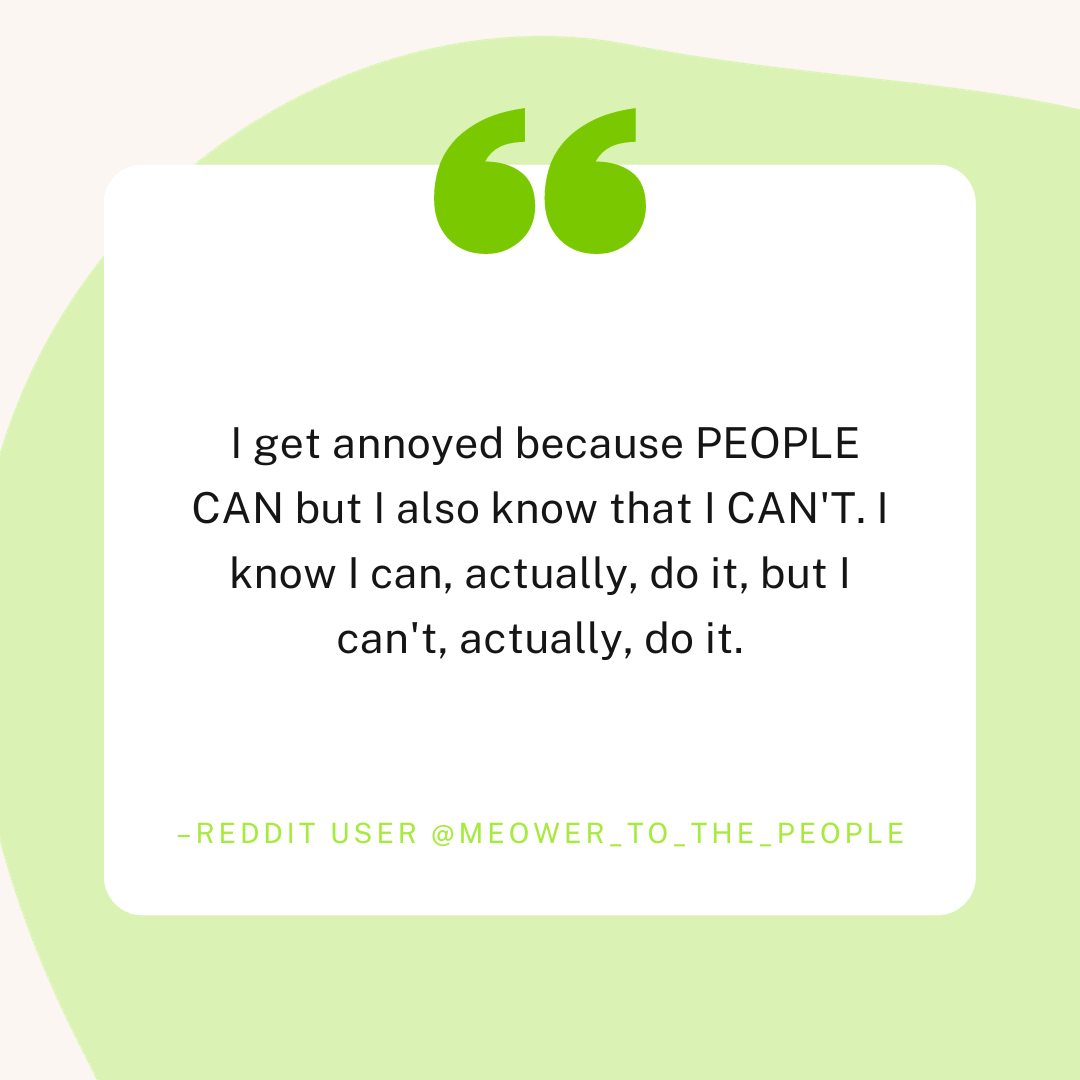
Habit stacking
Habit stacking describes a method some people use to make sure tasks are completed, and that they become ingrained in our life as habits so they are easily remembered. Some people with ADHD find this method useful, because it can sometimes be challenging to initiate tasks, or remember to complete them without a reminder.
It begins with a cue, which is something that is already part of your daily routine and something that you don’t easily forget. For example, brushing your teeth, having lunch, or packing your bag for work the next day.
The next step in the process is identifying the craving, which is the motivation for the new habit. For example, this could be wanting to have whiter teeth, wanting to feel more fit, or wanting to have a clean kitchen.
The key step involves attaching the new habit to the old routine. Some examples related to the above cues and cravings include:
- Using a whitening treatment straight after brushing your teeth
- Going for a walk on your lunch break
- Cleaning the kitchen straight after you pack your work bag
The final step of the process is reaping the reward for effectively stacking, which is two-fold – your craving has been fulfilled, and over time, you’ll gain a new habit if you continue the stacking method for a significant amount of time.
Example use: “I’m going to start stacking a walk onto my lunch break.”
Hyperfixation
Have you ever been so interested in something, that it’s all you can think about, and you don’t want to do anything else? Do you ever find that when you’re thinking about it or doing anything related to it, you feel like your attention is completely absorbed by it – to the point where you might lose track of time and what’s happening around you, or forget to eat? People with ADHD often experience this state, which is known as ‘hyperfixation’.
Although it’s not officially associated with the condition, people with ADHD are more likely to ‘hyperfixate’ on certain things that they are particularly fascinated by, such as a new hobby, or a recently discovered TV show or book series.
Example use: “I’ve been so hyperfixated on my TV show today, I didn’t get to any of my errands!”
TikTok user @marissapatry posted a skit explaining how hyperfixation affects them, which you can watch below:
Info dumping
Info dumping is something that people with ADHD, as well as other neurodiverse individuals, may experience. It is the act of almost ‘word-vomiting’ a large volume of information related to a particular topic or idea within a conversation. Sometimes, it might be difficult for someone who is info dumping to recognize that the person they are talking to might not be as interested in the topic as they are themselves, or that the other person might want to have input in the conversation.
Reddit user @elianna7 expressed what it feels like to be someone who often info dumps:
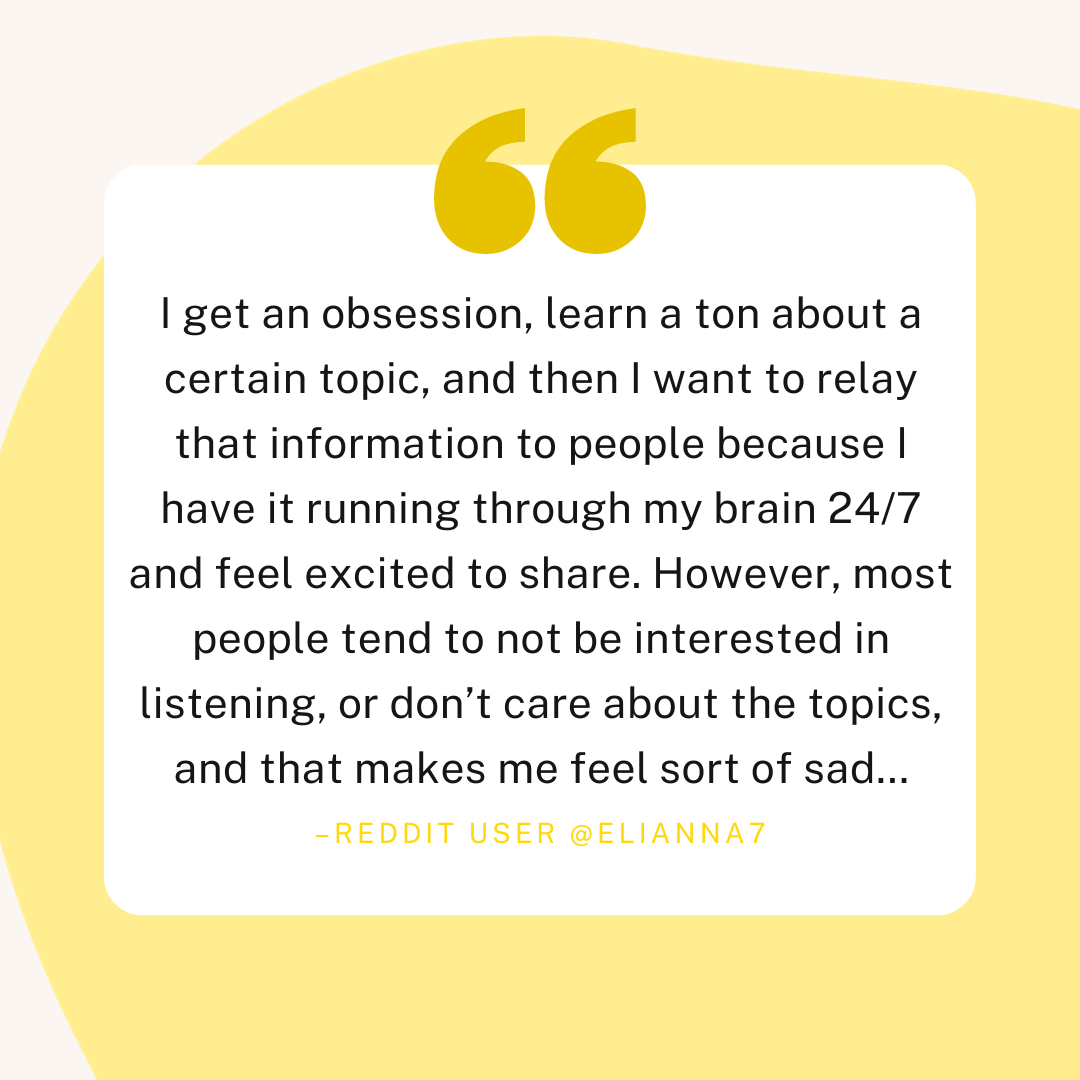
Rejection-sensitive dysphoria (RSD)
For anyone, experiencing rejection or failure can bring up a lot of negative and challenging emotions. For some people with ADHD, it seems that they feel the pain of letting themselves or others down or receiving criticism in a deeper way than usual. These reactions may trigger more severe emotional sensitivity than expected, alluded to by the term ‘dysphoria’ which means ‘difficult to bear’.
X (formerly known as Twitter) user @caramelized_bat described how RSD affects them:
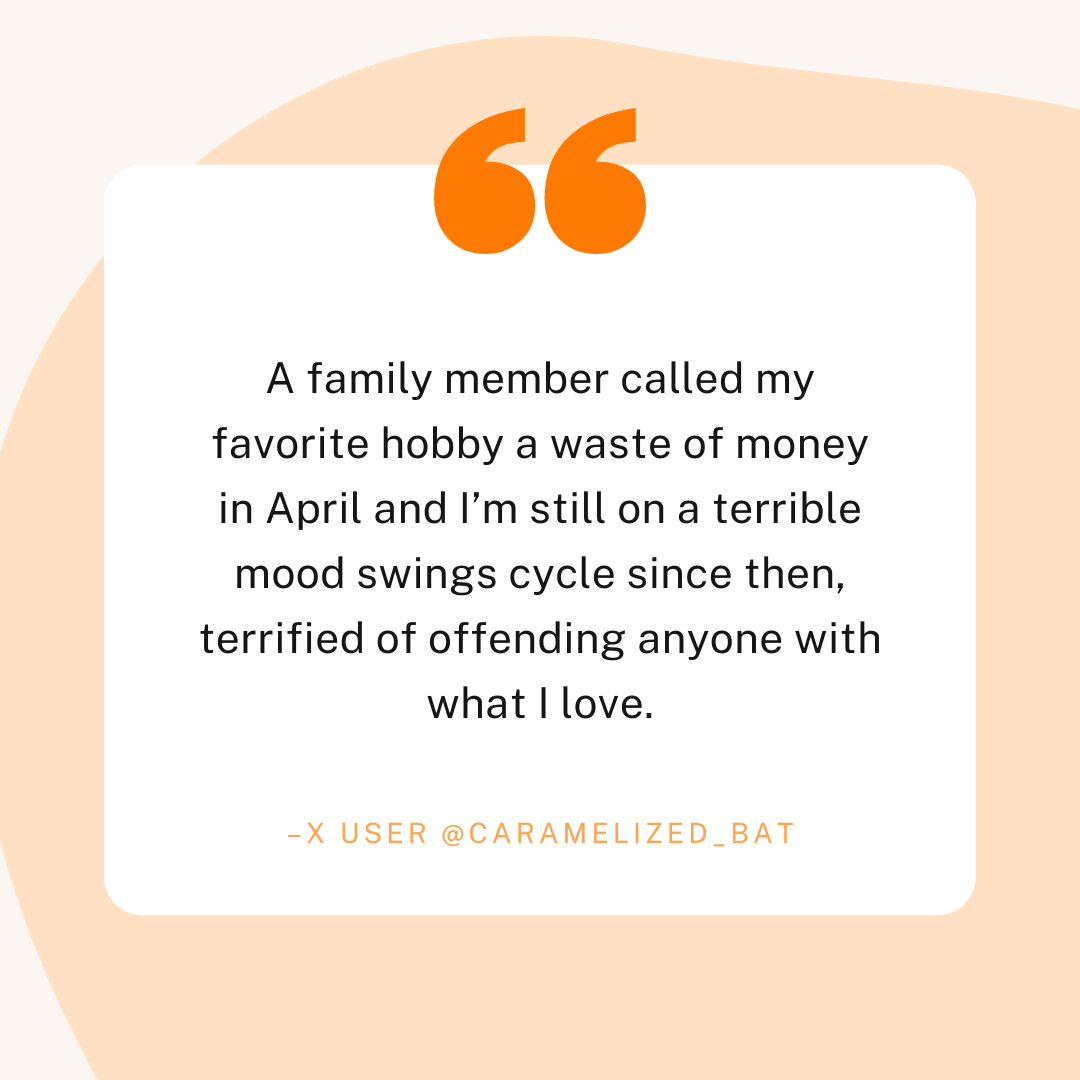
Revenge bedtime procrastination
Revenge bedtime procrastination refers to the act of delaying sleep to do activities we enjoy instead. It is thought to be motivated by a desire to make up for lost time that was spent on doing tasks that were less gratifying during the day, such as work or chores. This of course can lead to decreased sleep time and daytime sleepiness.
Example use: “I’m so tired today, but last night I just couldn’t stop the revenge bedtime procrastination, so I was awake until three in the morning because I was reading.”
Spoons
The ‘Spoon Theory’ was coined by writer Christine Miserandino, who has Lupus. When she was asked “What does it feel like, to be you, and to be sick?”, Christine explained her feelings using an analogy about spoons.
People without a chronic illness have an infinite amount of spoons. Unlimited possibilities for every day – the energy and ability to do whatever they want without consequences on their physical/mental health, for the most part.
People with a chronic illness start each day with a limited number of spoons. “The difference in being sick and being healthy is having to make choices or to consciously think about things when the rest of the world doesn’t have to.”
For chronically ill people, every task costs spoons. Every action is a conscious choice that expends energy, energy that runs out in a way that people without a chronic illness may not experience.
You have to choose wisely. Some days you have more spoons, and others less. You can’t do everything you want, or even need to. No spoons = no capacity to do more. Thus, choice and strategy about every action is paramount.
Some people who have a chronic health condition, like ADHD, consider themselves part of the ‘Spoonie’ community.
Example use: “I’ve run out of spoons already, and I haven’t even finished everything I wanted to do.”
Stimming/stim
Stimming is not limited to people with ADHD, but it is a behavior people with ADHD may perform. It means to ‘self-stimulate’ the senses, hence the name ‘stimming’, and it might look like what we normally call ‘fidgeting’. Stimming usually refers to repetitive tactile behaviors, such as hand flapping, biting or picking the lips, or rubbing the hands together.
It’s not clear why stimming happens exactly, but it is believed to be a strategy used to self-regulate emotions and physical sensations in certain situations, such as when they feel stressed, or they are overwhelmed by sensory information in the environment.
Stimming can be either conscious, in that the individual is actively choosing to ‘stim’ (verb for when stimming occurs), or sometimes it will happen subconsciously, without an active choice.
Example use: “I’ve recently been using a pencil to stim by twirling it in my hair.”
Time blindness
Time blindness refers to a difficulty some people with ADHD have in recognizing how much time has passed, and in estimating how much time will be needed to do something. People with ADHD may have a disrupted perception of time, which may lead to instances where they’re running late or taking too much time to complete a task. This is not a conscious choice or an intentional act of disrespect for other people’s time, it’s a consequence of how the ADHD brain works.
Autistic ADHDer Morgan Foley posted a skit about their experience with time blindness on TikTok, which you can watch below:
Wall of awful
As explained in the video below, the 'Wall of Awful' is an emotional barrier that people with ADHD may experience. The Wall is constructed from bricks made of failure, disappointment, rejection, worry and other negative emotions gained from past experiences of attempting to complete certain tasks.
So, when we go to complete one of these tasks again, we are emotionally blocked from doing so by the Wall of Awful. It can sometimes take a bit of time to ‘climb’ the wall of awful and complete the tasks.
Working memory
The working memory is a sort of ‘mental scratchpad’ of things we need to keep in mind when we’re planning, organizing, or completing tasks. It’s a form of short-term memory that helps us recall information we might need while we’re completing a specific action or set of actions. For example, directions we need to remember in order to get somewhere new, a telephone number someone just told you to call, or where you put the keys you just had in your hand so you can go out.
Some people with ADHD experience difficulties with working memory, which can make it challenging to complete tasks. The ADHD brain is easily distracted, and as such may struggle to keep the ‘scratchpad’ from being wiped clear once their brain has moved on to a different train of thought rather than the task at hand.
For example, if a neurotypical person was asked to grab some milk out the fridge whilst they’re on the way to put their keys by the front door, they could probably get this done with no problems, because their working memory is able to juggle both of these requests – ‘get milk’ and ‘put keys away’ – at the same time. For someone with ADHD, it wouldn’t be unlikely to find the keys in the fridge after they had successfully retrieved the milk and walked away, because their working memory had a bit of trouble remembering they were supposed to fulfill both requests.
To compensate for this, some ADHDers find it easier to make sure they finish one thing before starting the next. If you have ADHD, it might be helpful to be clear with others that you’ll be able to help them with what they need, but not right away or when you’re in the middle of something else, because your ADHD brain gets overwhelmed when dealing with multiple tasks at once. Just let them know you’ll be right there… as soon as you’ve put the keys away (and not in the fridge!).
X user @PaladinAmber described how working memory difficulties affect people with ADHD in their experience:
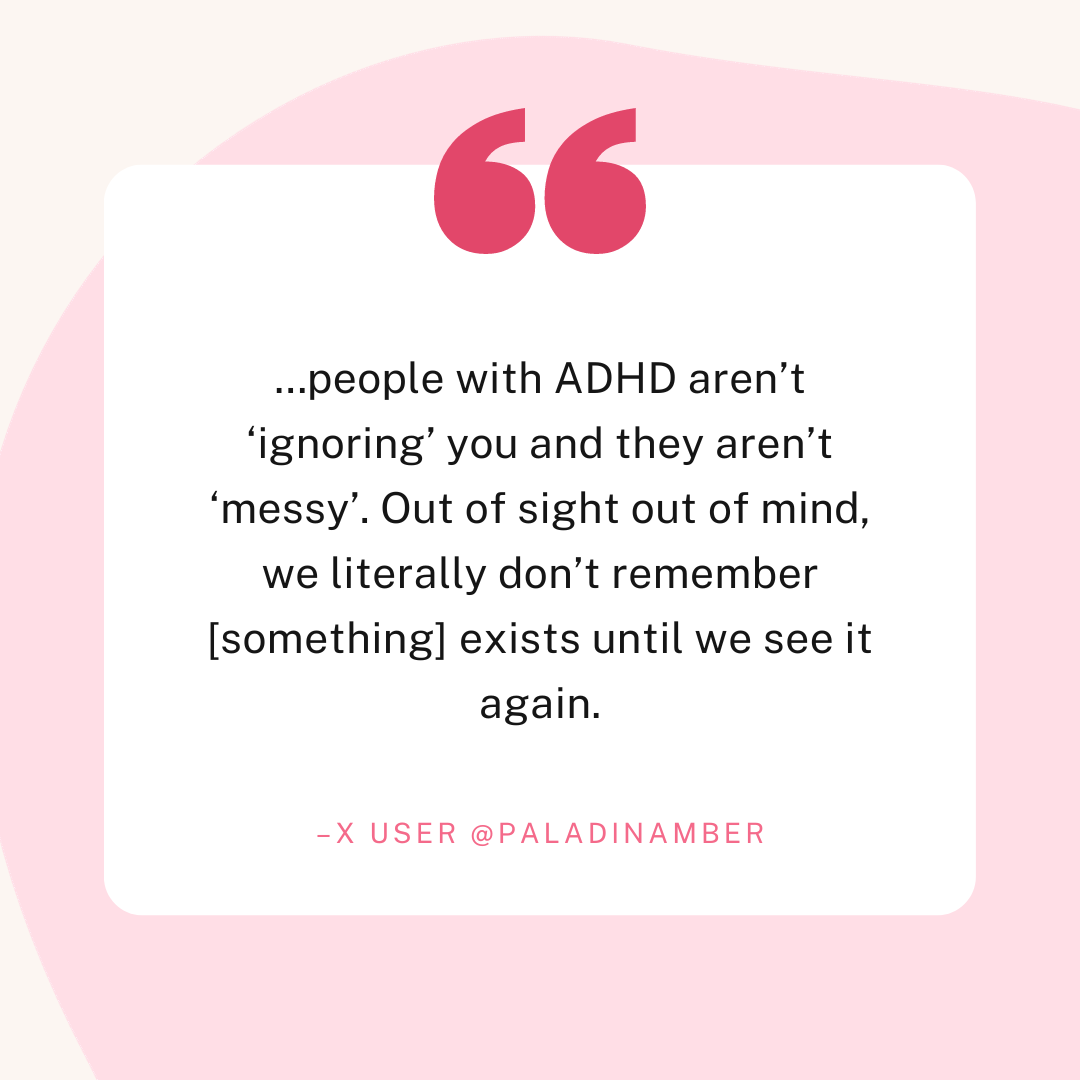
Resources
This is a div block with a Webflow interaction that will be triggered when the heading is in the view.










.jpg)





.png)

